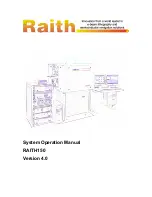
Solar Blue User Manual
78
7.
Urethral Pressure Profile (UPP)
7.1
Introduction
The Urethral Pressure Profile (UPP) investigation assesses the intraluminal
pressure along the length of the urethra. This pressure represents the ability of
the urethra to prevent leakage.
Two types of UPP may be measured:
•
Resting UPP, with the bladder and subject at rest
•
Stress UPP, with a defined applied stress; for example, cough and strain
Urethral pressure profiles are performed with a partially filled bladder. You can
repeat this procedure for different bladder fillings. The UPP study can be
performed manually or by using a catheter puller. The pull speed can be set in
the investigation protocol (see § 12.5).
7.2
Channels
The following channels can be measured during a UPP investigation:
•
Vesical pressure
P
ves
(P1)
•
Abdominal pressure
P
abd
(P2)
•
Urethral pressure
P
ura
(P3)
•
Detrusor pressure
P
det
(P1-P2) (calculated)
•
Closure pressure
P
clos
(P3-P1) (calculated)
•
Infused volume
V
in
•
EMG
EMG
•
Miction volume
V
mic
•
Miction flow
Q
ura
The simultaneous recording of both detrusor pressure and intra-urethral
pressure is essential during profilometry, to exclude detrusor contractions.
During a UPP investigation the patient should be awake, un-anaesthetized,
and neither sedated nor taking drugs that affect bladder function. Any
variations should be specified.
















































